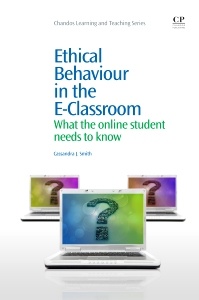Ethical Behaviour in the E-Classroom What the Online Student Needs to Know Chandos Learning and Teaching Series
Auteur : Smith Cassandra

Dedication
List of figures
Acknowledgements
About the author
Introduction to ethical behaviour in the e-classroom
Course design
Objectives
Format
Chapter 1: Assessing behaviour
Abstract:
Ethics definition
What does “good behaviour mean?
Ethics and e-classes
Planning
Carrying out
Evaluating
How does self-directed learning relate to ethics?
Code of ethics
Summary
Chapter 2: Ethical theories and e-learning
Abstract:
Ethical theories
Ethical theories and e-learning
Ethical theories and moral character
Summary
Chapter 3: Processing thoughts: critical thinking
Abstract:
Critical thinking defined
Critical thinking in e-learning
Identifying and challenging assumptions
Critical thinking and posing questions
How do inferences and assumptions factor in critical thinking?
Summary
Chapter 4: Rules of conduct: plagiarism
Abstract:
Plagiarism defined
Plagiarism in e-learning
Citing sources
Summary
Chapter 5: Moral dilemmas online
Abstract:
Moral dilemmas
Self-efficacy
Students’ unpreparedness issues
Online excuses
Summary
Chapter 6: Transformative language: communication in e-learning
Abstract:
Transformative language
Transforming language
Online tone
Ethical dilemmas in communication
Conflict resolution
Personality types
Summary
Chapter 7: Ethics boards: discussion responses
Abstract:
Discussion interaction
Discussion question basic format
Bloom’s cognitive taxonomy
Summary
Chapter 8: Adhering to principles: researching
Abstract:
Research
How to research
How to write
Grammar tips
Written assignments – essays
Reza
Alice
Sherman
Discussion nightmares! What role does technology play? by McBride and Smith (April 2009)
Summary
Chapter 9: Critical thinking
Abstract:
Critical thinking and unethical decisions
Case one
Critical thinking and time management
Critical thinking and discussions
Critical thinking and essay development
Critical thinking and ethics
Internal factors
External factors
Summary
Chapter 10: Ethical expectations: students
Abstract:
Ethical expectations
Learning with a purpose
Commitment to class
Ethical disposition
Motivation
Tips for being a successful online student
Summary
Closing remarks
References
Index
- Presents real-life scenarios to allow the reader to understand the reality of ethical issues online
- Includes the critical thinking circle, an original design by the author highlighting external and internal factors that influence adult students’ ethical decision-making process
- Written for the adult student to meet his or her degree goals in the online learning environment
Date de parution : 05-2012
Ouvrage de 198 p.
15.5x23.2 cm



